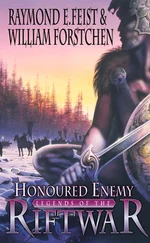Borrego clamped a paw on the Guatemalan’s shoulder. The guy flinched but didn’t bolt, Cooper thinking maybe because he couldn’t with Borrego’s grip planting him in place.
“I can understand how you’d feel that way,” Borrego said. “And since you’re now out of the business, I’d like to ask you something I don’t normally ask.”
“Hey,” the guy said, “whatever you want.”
“I want you to tell me where you got it,” Borrego said.
“You mean the shit that came with the curse?”
“Yeah,” Borrego said. “The shit that came with the curse.”
“Hell, I’ll tell you exactly where it is. I kept the map in my bag ’cause I figured there’d be more. You know, that we didn’t get it all, ’cause nobody’s been up there. Not before we went and probably not after. So I was thinking, before the curse got us, I’d be going back. Not now, though. Fuck!”
His last F-bomb came out a little loud-a few of the ex-cons flicked their eyes in Borrego’s direction to check whether anything was developing.
The Guatemalan lowered his head.
“I should have known,” he said, more quietly.
“Should have known what?” Borrego said.
“Should have known we’d all get the curse.”
Cooper could see Borrego’s face since he’d turned his body earlier in the conversation. He watched as the Polar Bear narrowed his eyes.
“Why,” he said.
“Because everybody else had the fucking curse,” the Guatemalan said, “that’s why.”
“Everybody else where?”
“In the place where we found it.”
“Who?” Borrego asked.
“All of them,” the Guatemalan said. “Could have been a thousand years ago-I don’t know. I just know they were dead. Every one of them.”
Borrego said nothing. Madrid said nothing. Cooper continued to say nothing. From behind one of the mostly painted cars Cooper saw the figure of the heavy-jowled guy with the pitted-out T-shirt appear. It was unclear how he’d come into the building, but Cooper supposed it didn’t particularly matter. He wasn’t there to ambush them-he was there to pressure the Guatemalan to get his ass back to work. The Guatemalan felt the man’s presence and swiveled his head to take in the sight of his super.
“You want me to get you the map, then?” he said to Borrego.
“Be great,” the Polar Bear said, and lifted his paw from the Guatemalan’s shoulder.
When the Guatemalan returned from his locker with the rumpled piece of paper, Borrego took it, but not before handing the cornered mouse a chunk of bills, the denominations of which Cooper couldn’t quite read. Then the man moved off and blended back into the shop.
Without any visible prompt from Borrego, Madrid strode purposefully to the heavy-jowled super, handed the man another chunky wad of bills, then came back and led them out through the blue curtain.
When they were situated in the Land Rover, Borrego leaned forward in his throne and clamped down on Cooper’s shoulder with that big fat paw of his.
“Don’t know about you, amigo,” he said, “but with all this talk of curses, I’ve got myself worked up into a four-pound-lobster kind of mood.”
The Guatemalan’s map suggested a route that, on paper and highway alike, may well have been the most convoluted possible means of approach on their destination. Nonetheless this was the route they took-nearly six hundred winding miles, some of the way paved but most not, the first four hours spent worming their way out of Belize, the remaining twelve dedicated to working their way around, then up, what Cooper decided had to be one of the more treacherous mountain ranges north of the Andes.
“They’re good,” was all Borrego had told him in answer to Cooper’s objection to the length-and path-of the line drawn on the map. “They know what they’re doing.”
“The dead tomb diggers, you mean?” Cooper said.
“Yes,” Borrego said.
“You say so,” Cooper said.
Around sunset, they hit a rebel checkpoint.
It had been eight hours since they cleared the Guatemala border crossing. That had been fluid-show your passports, hand over some cash, and away you go, Borrego explaining nobody was looking to keep people out of Guatemala, since anybody who came in was usually a tourist ready to spend some money. Check out the Mayan ruins, drop some coin on a guide or two-there existed no reason for the authorities to concern themselves with the pesky issue of border control, at least on the immigration front.
The challenge, Borrego explained, came at the rebel checkpoints.
The leftist rebel groups in Guatemala had been soundly defeated by American-backed government forces in the mid-1980s, but had more or less never given up. As a sort of consolation prize they had claimed certain remote regions of the country as their own, and been allowed to do so-mainly because almost nobody lived in the areas they’d been sequestered to, and even fewer people wanted to go there. Accordingly, there was little harm in allowing the armed factions who’d once waged war on the streets of the nation’s capital to reside and rule in relative peace in the remote countryside.
Try to do some business out here, though, Borrego telling Cooper, and you were in for some serious taxation. That, he said, was one of the main reasons he had such a skinny margin on his antiquities-wholesale business: most of the places you found original, as-yet-undiscovered artifacts-in Guatemala, Egypt, northern Africa, or anywhere else for that matter-you had enough local strife, usually inclusive of civil war, to require payoffs rivaling the profits you stood to make in the first place.
The other part of it, Borrego said, was no matter how much you paid these guys, they still tended to want to seize whatever you had on board, and sometimes, just for the hell of it, they’d toss you in whatever sort of jail they’d been able to assemble.
“Kind of a raw deal for anybody doing the bribing,” Cooper said.
“Raw-or stupid,” Borrego told him between gulps of Gatorade. “Plus, the boundaries are always changing, so you never quite know who’s controlling what.”
“So once in a while,” Cooper said, “you’ve paid the wrong guy.”
“Most of the while,” Borrego said. “Meaning you wind up paying two, three guys before you’re through. Of course, that’s about how we do it in Caracas too.”
For an insane moment, as they approached the two guys in fatigues, Cooper thought he recognized one of the rebel soldiers-and that the soldier recognized him. Madrid eased to a stop, and for a very real instant, Cooper caught eyes with the soldier on his side of the Defender. He suddenly knew he’d been caught-caught-the man seeing his picture on a “Most Wanted” flyer posted following his escape, the guard knowing immediately he’d found an enemy of the state-
We know you, the soldier’s eyes telling him, and now we have you.
Panic welled in his chest like bubbling bile, and he almost made a knifing move for his gun, thinking he could take both of them with two quick shots-
When he remembered where he was. They were in a different Central American country-goddammit. Cooper also recognized how young the kid with the rifle was. Seventeen at best, but probably fourteen or fifteen with the tough country life he must be living out here.
These guys weren’t even born when you were last in the neighborhood.
The velociraptor had some words with the soldier on his side, among the words Cooper overheard being Oso Blanco and dinero-and for another instant, Cooper’s eyes locked with the kid on his side of the road.
Then the teenage rebel dropped his look and waved them past with a relaxed, menacing swish of his rifle, and they were through.
Читать дальше
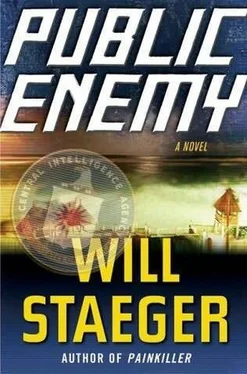
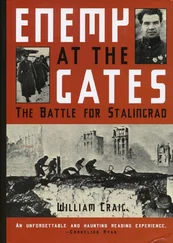

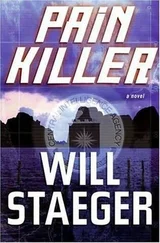
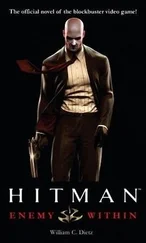
![Томас Гарди - Джуд неудачник [Литрес, Public Domain]](/books/437392/tomas-gardi-dzhud-neudachnik-litres-public-domain-thumb.webp)





